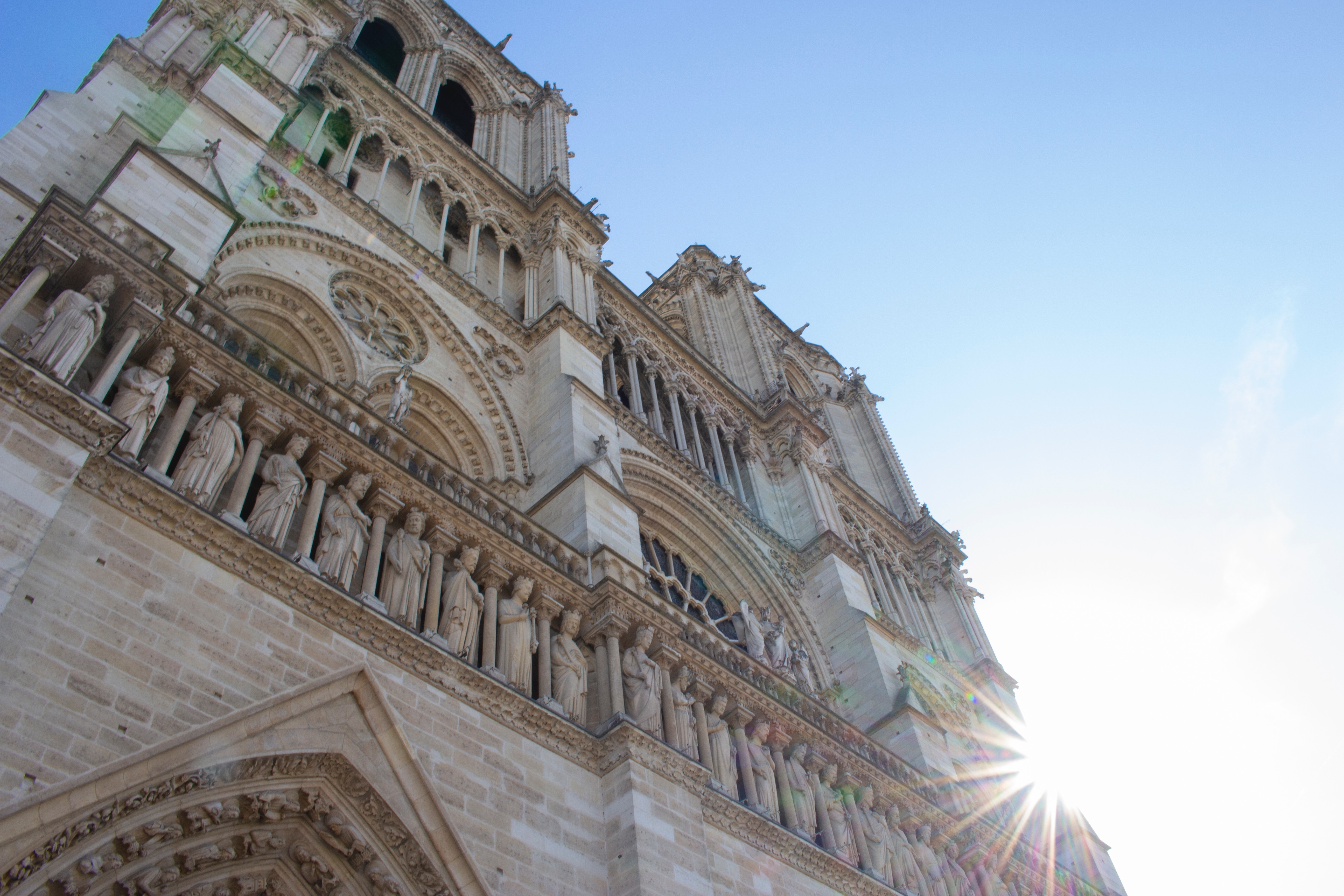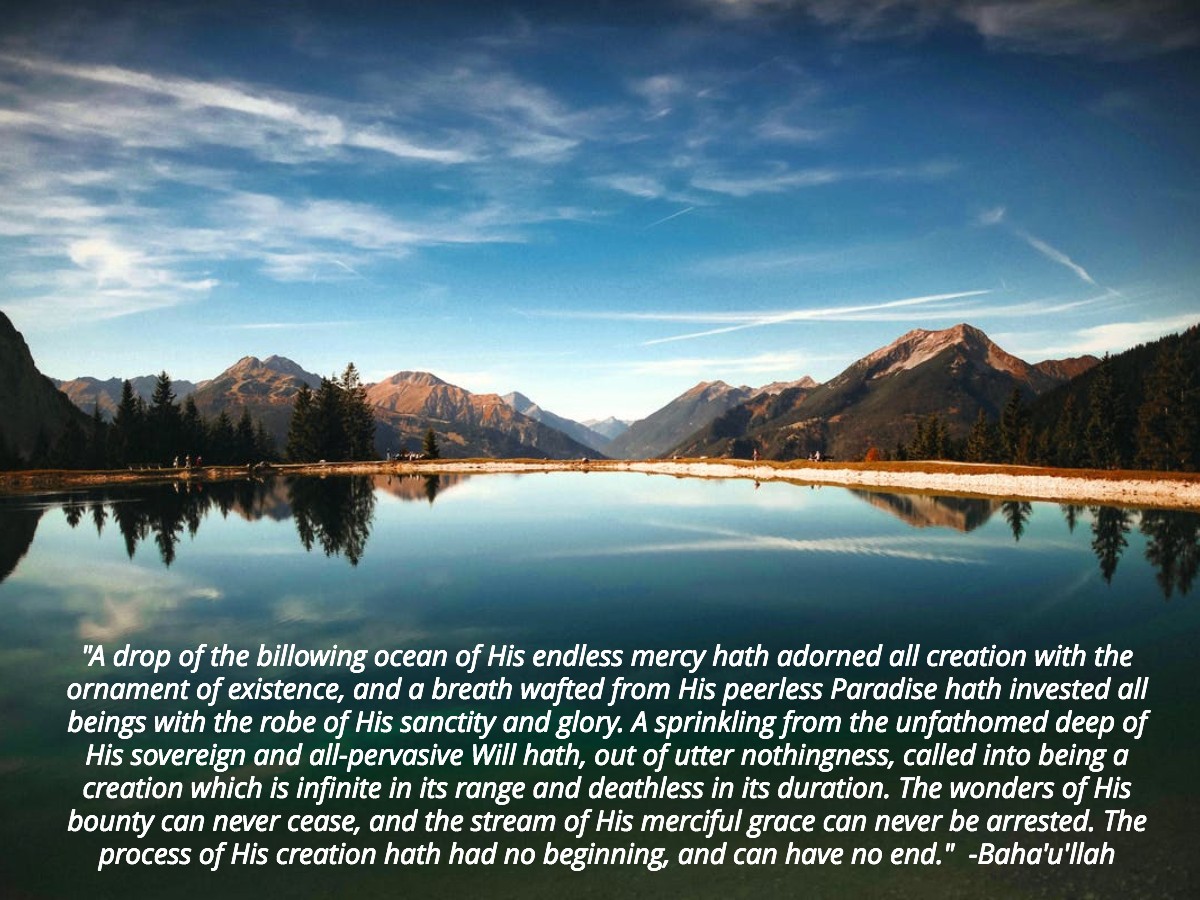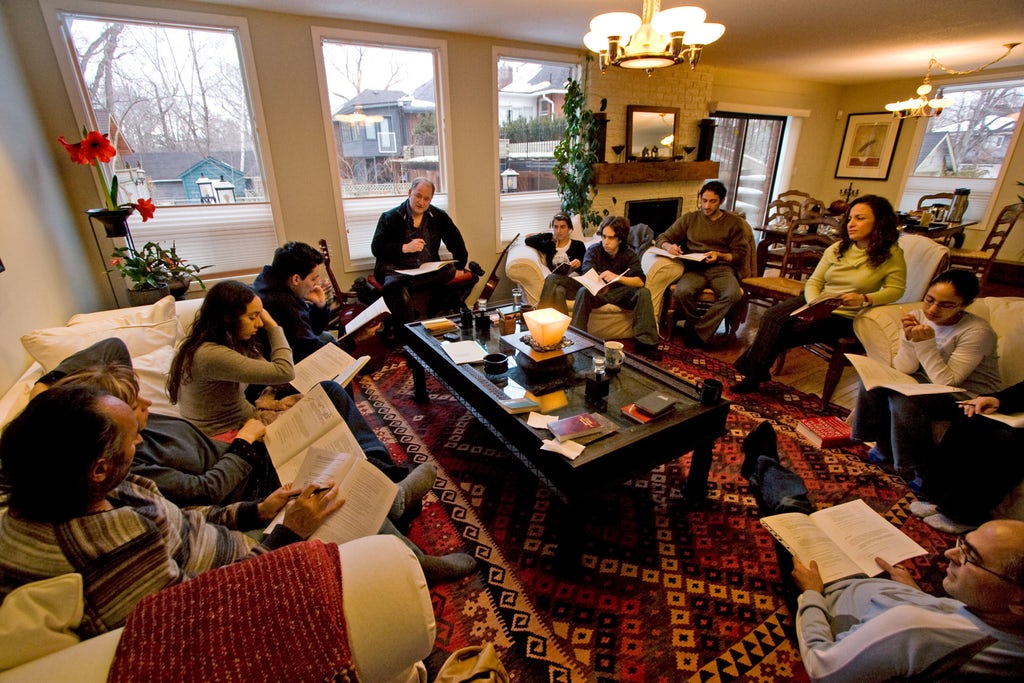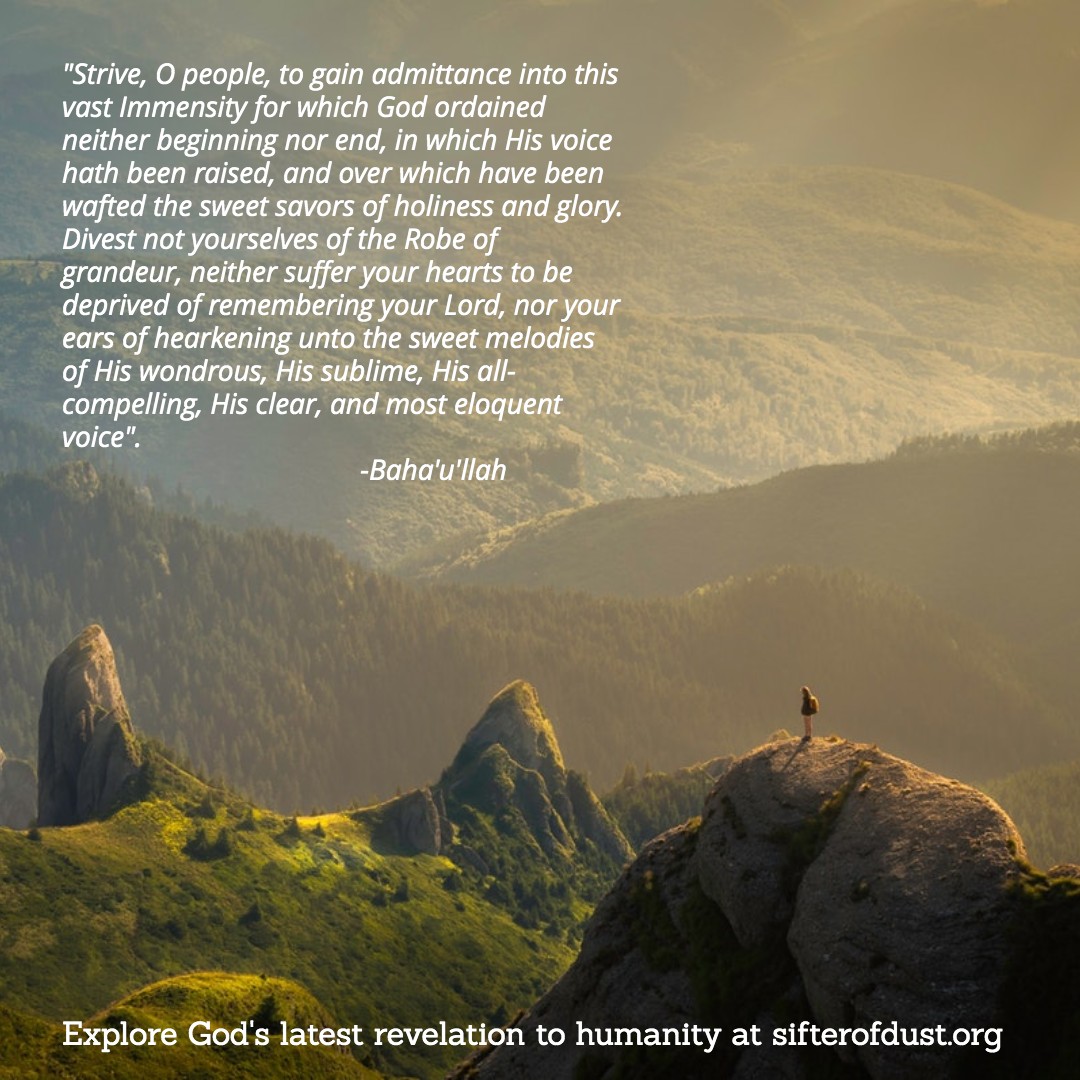The Revelation of Baha’u’llah is extraordinarily deep and far-reaching, touching on the most fundamental aspects of life and reality. Baha’u’llah describes His Revelation as an “ocean” rich in “gems”, and as we explore the world both philosophically and scientifically, we start to see connections with the Word of God that illuminate our understanding on a very deep level. Baha’i Blog often presents wonderful material that explores the richness of Baha’u’llah’s Faith and they recently posted an interview between Rainn Wilson- the Baha’i actor, philanthropist, and all-around good guy, and Dr Stephen Phelps. Dr Phelps has had the opportunity to study physics at the highest level and also study the Baha’i Writings in great depth, personally teaching himself both Arabic and Persian in order to do so. The conversation is worth a listen, as it serves to provide a taste of the richness of the Writings when applied to some of the modern questions of the nature of who we are and what we are doing in this thing called life. Enjoy!
Sifter of Dust Posts
On Miracles
The following continues our series on the Gospels and the Revelation of Baha’u’llah-
Even a cursory review of the Gospels reveals a significant amount of attention paid to the miracles of Jesus, and then later even his apostles. These miracles are often described in very specific terms- like literally raising a person from the dead or giving sight to the blind. The passage below, again from the Gospel of Matthew, is just a sample-
“While he was saying this, a synagogue leader came and knelt before him and said, “My daughter has just died. But come and put your hand on her, and she will live.” Jesus got up and went with him, and so did his disciples.
Just then a woman who had been subject to bleeding for twelve years came up behind him and touched the edge of his cloak. She said to herself, “If I only touch his cloak, I will be healed.”
Jesus turned and saw her. “Take heart, daughter,” he said, “your faith has healed you.” And the woman was healed at that moment.
When Jesus entered the synagogue leader’s house and saw the noisy crowd and people playing pipes, he said, “Go away. The girl is not dead but asleep.” But they laughed at him. After the crowd had been put outside, he went in and took the girl by the hand, and she got up. News of this spread through all that region.
As Jesus went on from there, two blind men followed him, calling out, “Have mercy on us, Son of David!” When he had gone indoors, the blind men came to him, and he asked them, “Do you believe that I am able to do this?”
“Yes, Lord,” they replied.
Then he touched their eyes and said, “According to your faith let it be done to you”; and their sight was restored. Jesus warned them sternly, “See that no one knows about this.” But they went out and spread the news about him all over that region.
While they were going out, a man who was demon-possessed and could not talk was brought to Jesus. And when the demon was driven out, the man who had been mute spoke. The crowd was amazed and said, “Nothing like this has ever been seen in Israel.”
But the Pharisees said, “It is by the prince of demons that he drives out demons.”
For the people in the time of Jesus, these stories would have likely been a major reason that they would have believed in Him. In modern times, people are much more skeptical, and the miracles stories probably do more to hurt the cause of belief in Jesus than help it. Thomas Jefferson, who was a Christian, famously created a Bible known as the “Jefferson Bible” in which he took out all the stories of Jesus performing miracles and only highlighted his spiritual and ethical teaching. Jefferson thought that the miracle stories clouded the picture of the true greatness of Jesus.
Baha’u’llah’s teaching on the miracles of the Manifestations is nuanced. Baha’u’llah discouraged His followers from focusing on miracles and asked them to believe in His Revelation based on the effects of His words on their heart. The Bab had even stated that, in the past, the proof of the revelation of God came through “physical” proofs, but in our time, it needed to be through the heart, as humanity had advanced in its spirituality and needed to base its belief on a more sublime understanding of spiritual truth.
In a Tablet to an Orthodox priest, Baha’u’llah describes the greatness of Christ-
“Know thou that when the Son of Man (Jesus) yielded up His breath to God, the whole creation wept with a great weeping. By sacrificing Himself, however, a fresh capacity was infused into all created things. Its evidences, as witnessed in all the peoples of the earth, are now manifest before thee. The deepest wisdom which the sages have uttered, the profoundest learning which any mind hath unfolded, the arts which the ablest hands have produced, the influence exerted by the most potent of rulers, are but manifestations of the quickening power released by His transcendent, His all-pervasive, and resplendent Spirit.
We testify that when He came into the world, He shed the splendor of His glory upon all created things. Through Him the leper recovered from the leprosy of perversity and ignorance. Through Him, the unchaste and wayward were healed. Through His power, born of Almighty God, the eyes of the blind were opened, and the soul of the sinner sanctified.
Leprosy may be interpreted as any veil that interveneth between man and the recognition of the Lord, his God. Whoso alloweth himself to be shut out from Him is indeed a leper, who shall not be remembered in the Kingdom of God, the Mighty, the All-Praised. We bear witness that through the power of the Word of God every leper was cleansed, every sickness was healed, every human infirmity was banished. He it is Who purified the world. Blessed is the man who, with a face beaming with light, hath turned towards Him.”
As one can see, He urges us to interpret the miracles of Jesus in a spiritual way. Whether or not the leper was healed of their physical leprosy was inconsequential. It was the recovery from their “perversity and ignorance” that was the most important thing. The Manifestations of God come to heal spiritual illnesses, not physical ones (and indeed Baha’u’llah explicitly left that job to science!)
Baha’u’llah is clear however, that the Manifestations of God can do miracles, if need be. In fact, when a group of clergy in the time of Baha’u’llah sent an emissary to question him, Baha’u’llah told the emissary to gather the clergy and settle on a miracle for Him to perform and He would do it. However, the stipulation was that if He did it, they then had to accept His Revelation. The clergy did not accept the challenge as they couldn’t agree on a miracle. In another passage, Baha’u’llah further said that something is a miracle only if one doesn’t understand it, that “human reason is not the balance” as it is based on our experience, and human experience is limited. We wouldn’t believe a description of the sun in the sky if we didn’t see it every day. That the Manifestations of God can do a miracle is just because of the reality of who they are. It is not a miracle as it proceeds from their role as representatives of God.
So did Jesus perform real miracles or were these just stories that reflect healing from spiritual sicknesses and not physical ones? Or did the Gospel authors, who wrote 100 years after Jesus, transmit these stories in order to convince people of His truth, irrespective of whether He actually did miracles? We will probably never know.
But Baha’u’llah’s Revelation does teach us something really important. Whether or not actual miracles did occur, the most important thing about Jesus was the effect His teachings had on human hearts. The fact that we are still talking about Him, now 2000 years after His life, and He still profoundly impacts people on a daily basis, is the true testament to His greatness.
Next post in this series- The Way, the Truth, and the Life.
Prayer
The following continues our discussion of Gospel passages and how they are related to the Revelation of Baha’u’llah. The passage below is from the Gospel of Matthew-
“Be careful not to practice your righteousness in front of others to be seen by them. If you do, you will have no reward from your Father in heaven.
“So when you give to the needy, do not announce it with trumpets, as the hypocrites do in the synagogues and on the streets, to be honored by others. Truly I tell you, they have received their reward in full. But when you give to the needy, do not let your left hand know what your right hand is doing, so that your giving may be in secret. Then your Father, who sees what is done in secret, will reward you.
“And when you pray, do not be like the hypocrites, for they love to pray standing in the synagogues and on the street corners to be seen by others. Truly I tell you, they have received their reward in full. But when you pray, go into your room, close the door and pray to your Father, who is unseen. Then your Father, who sees what is done in secret, will reward you. And when you pray, do not keep on babbling like pagans, for they think they will be heard because of their many words. Do not be like them, for your Father knows what you need before you ask him.
This passage from the Gospel of Matthew is Jesus’ main instruction to His community on how to pray. It is followed by a short prayer, known as the “Lord’s Prayer”, that starts “Our father, who art in heaven…” and is well known to anyone who has attended a church service, because it is often spoken together by the congregation.
Prayer can be a controversial topic in today’s society because many people perceive that the reason one prays is to ask for stuff, and that is its main purpose. Many people no longer believe that God cares for us in that way, and therefore prayer is essentially useless for what is perceived to be its main purpose.
But if you read the “Lord’s Prayer” or the dozens of prayers that Baha’u’llah and Abdu’l-Baha revealed that are translated into English, it becomes evident that the Manifestations of God had a different idea of prayer than the common one. First off, it is never about asking for stuff- at least not material stuff- that is. There is virtually no prayer that can be found that is about asking for material things, or even that events will turn out your way. They are virtually all about developing spiritual qualities.
For instance- take this well known and beautiful prayer by Baha’u’llah-
Create in me a pure heart, O my God, and renew a tranquil conscience within me, O my Hope! Through the spirit of power confirm Thou me in Thy Cause, O my Best-Beloved, and by the light of Thy glory reveal unto me Thy path, O Thou the Goal of my desire! Through the power of Thy transcendent might lift me up unto the heaven of Thy holiness, O Source of my being, and by the breezes of Thine eternity gladden me, O Thou Who art my God! Let Thine everlasting melodies breathe tranquillity on me, O my Companion, and let the riches of Thine ancient countenance deliver me from all except Thee, O my Master, and let the tidings of the revelation of Thine incorruptible Essence bring me joy, O Thou Who art the most manifest of the manifest and the most hidden of the hidden!
In a remarkable prayer, Baha’u’llah says that the purpose of prayer is to bring us closer to our own true selves-
Whatever duty Thou hast prescribed unto Thy servants of extolling to the utmost Thy majesty and glory is but a token of Thy grace unto them, that they may be enabled to ascend unto the station conferred upon their own inmost being, the station of the knowledge of their own selves.
‘Abdu’l-Baha’ further clarifies that the purpose of prayer is to stimulate our own inner spirituality-
When one supplicates to his Lord, turns to Him and seeks bounty from His Ocean, this supplication brings light to his heart, illumination to his sight, life to his soul and exaltation to his being. During thy supplications to God and thy reciting, “Thy Name is my healing,” consider how thine heart is cheered, thy soul delighted by the spirit of the love of God, and thy mind attracted to the Kingdom of God! By these attractions one’s ability and capacity increase. When the vessel is enlarged the water increases, and when the thirst grows the bounty of the cloud becomes agreeable to the taste of man. This is the mystery of supplication and the wisdom of stating one’s wants.
As our love of God grows, and it becomes more a part of our lives, we pray as an expression of love-
In the highest prayer, men pray only for the love of God, not because they fear Him or hell, or hope for bounty or heaven…. When a man falls in love with a human being, it is impossible for him to keep from mentioning the name of his beloved. How much more difficult is it to keep from mentioning the Name of God when one has come to love Him…. The spiritual man finds no delight in anything save in commemoration of God.
Just as Jesus taught that our prayers should be in private, Baha’u’llah taught us that our prayers should similarly be in private and away from others, unless it is part of a devotional gathering dedicated to the purpose of communal connection. Baha’i’s host devotional gatherings for their communities all over the world, but these are intended to stimulate spiritual discussion and friendship.
To none is it permitted to mutter sacred verses before the public gaze as he walketh in the street or marketplace; nay rather, if he wish to magnify the Lord, it behooveth him to do so in such places as have been erected for this purpose, or in his own home. This is more in keeping with sincerity and godliness. Thus hath the sun of Our commandment shone forth above the horizon of Our utterance. Blessed, then, be those who do Our bidding.
Baha’u’llah also suggested we should “intone” our prayers- a word that suggests chanting or singing-
Intone, O My servant, the verses of God that have been received by thee, as intoned by them who have drawn nigh unto Him, that the sweetness of thy melody may kindle thine own soul, and attract the hearts of all men. Whoso reciteth, in the privacy of his chamber, the verses revealed by God, the scattering angels of the Almighty shall scatter abroad the fragrance of the words uttered by his mouth, and shall cause the heart of every righteous man to throb. Though he may, at first, remain unaware of its effect, yet the virtue of the grace vouchsafed unto him must needs sooner or later exercise its influence upon his soul. Thus have the mysteries of the Revelation of God been decreed by virtue of the Will of Him Who is the Source of power and wisdom.
As the Baha’i community has grown, more and more of the sacred Writings have been put to music, and those melodies are shared among the Baha’i communities- a terrific way to start connecting with the Word of God.
We’ll conclude with a beautiful passage from the Bab, on the nature of prayer and how we should think about it.
Worship thou God in such wise that if thy worship lead thee to the fire, no alteration in thine adoration would be produced, and so likewise if thy recompense should be paradise. Thus and thus alone should be the worship which befitteth the one True God. Shouldst thou worship Him because of fear, this would be unseemly in the sanctified Court of His presence, and could not be regarded as an act by thee dedicated to the Oneness of His Being. Or if thy gaze should be on paradise, and thou shouldst worship Him while cherishing such a hope, thou wouldst make God’s creation a partner with Him, notwithstanding the fact that paradise is desired by men. Fire and paradise both bow down and prostrate themselves before God. That which is worthy of His Essence is to worship Him for His sake, without fear of fire, or hope of paradise. Although when true worship is offered, the worshipper is delivered from the fire, and entereth the paradise of God’s good-pleasure, yet such should not be the motive of his act. However, God’s favour and grace ever flow in accordance with the exigencies of His inscrutable wisdom. The most acceptable prayer is the one offered with the utmost spirituality and radiance; its prolongation hath not been and is not beloved by God. The more detached and the purer the prayer, the more acceptable is it in the presence of God.
Next post in series- On Miracles
The Wonder of Creation
One of the beautiful truths expressed in Baha’u’llah’s Revelation is the majesty of creation, and how we are only a small part of its nearly infinite range. Despite being that small part, our lives have meaning through our relationship to the ultimate Source of that creation.
“A drop of the billowing ocean of His endless mercy hath adorned all creation with the ornament of existence, and a breath wafted from His peerless Paradise hath invested all beings with the robe of His sanctity and glory. A sprinkling from the unfathomed deep of His sovereign and all-pervasive Will hath, out of utter nothingness, called into being a creation which is infinite in its range and deathless in its duration. The wonders of His bounty can never cease, and the stream of His merciful grace can never be arrested. The process of His creation hath had no beginning, and can have no end.” -Baha’u’llah
Beautify Your Tongues
A quote from Baha’u’llah-
“Beautify your tongues, O people, with truthfulness, and adorn your souls with the ornament of honesty. Beware, O people, that ye deal not treacherously with anyone. Be ye the trustees of God amongst His creatures, and the emblems of His generosity amidst His people….Strive, O people, that your eyes may be directed towards the mercy of God, that your hearts may be attuned to His wondrous remembrance, that your souls may rest confidently upon His grace and bounty, that your feet may tread the path of His good-pleasure.”
Photo by Kevin Lanceplaine on Unsplash
Love of Your Neighbor
This post continues our series in which we are marching through the Gospels and making connections to the Revelation of Baha’u’llah. The passage below is from the Sermon on the Mount, from the Gospel of Matthew-
“You have heard that it was said, ‘Eye for eye, and tooth for tooth. But I tell you, do not resist an evil person. If anyone slaps you on the right cheek, turn to them the other cheek also. And if anyone wants to sue you and take your shirt, hand over your coat as well. If anyone forces you to go one mile, go with them two miles. Give to the one who asks you, and do not turn away from the one who wants to borrow from you.”
“You have heard that it was said, ‘Love your neighbor and hate your enemy.’ But I tell you, love your enemies and pray for those who persecute you, that you may be children of your Father in heaven. He causes his sun to rise on the evil and the good, and sends rain on the righteous and the unrighteous. If you love those who love you, what reward will you get? Are not even the tax collectors doing that? And if you greet only your own people, what are you doing more than others? Do not even pagans do that? Be perfect, therefore, as your heavenly Father is perfect.”
These words, spoken as part of the Sermon on the Mount, where Jesus Christ delivered the “Beatitudes” noted in the previous post, are extraordinarily important and significant for the spiritual and moral evolution of humanity on this planet. They represent a marked departure from the traditional morality taught in cultures all over the world before Christ, both within and outside of the Jewish tradition. The interactions between people, and social law generally, was marked by the ethic of “an eye for an eye”, meaning, if someone did someone to you, you had the right to do it back to them. Jesus Christ- with these passages- brought a new standard- and it changed everything.
“Christian charity”, the concern for others, treating even your enemies with respect- all of these things had untold effects on the societies that embraced Christianity- effects that are still felt today. Unfortunately, too often these societies also forgot this standard and fell back to the “pagan” standards of antiquity- an “eye for an eye”. How often have we seen a movie where something bad is done to the hero, and then the rest of the movie is about his effort to exact revenge on the perpetrators, who are cast as evil uncaring villains? This is not a Christian standard but a pre-Christian one that humanity was supposed to have outgrown by now.
Baha’u’llah’s Revelation builds upon the standard of Jesus, as expressed in numerous passages. Baha’u’llah teaches that are vision should now be “world embracing” and that we should expand “love of our neighbor” beyond just our actual neighbor, but everyone in the whole world. “Ye are the fruits of one tree and the leaves of one branch. Deal ye one with another with the utmost love and harmony, with friendliness and fellowship”.
He encourages us, as in the following passage, to follow the teachings of God and “taste its sweetness”-
Beseech ye the one true God to grant that ye may taste the savor of such deeds as are performed in His path, and partake of the sweetness of such humility and submissiveness as are shown for His sake. Forget your own selves, and turn your eyes towards your neighbor. Bend your energies to whatever may foster the education of men. Nothing is, or can ever be, hidden from God. If ye follow in His way, His incalculable and imperishable blessings will be showered upon you. This is the luminous Tablet, whose verses have streamed from the moving Pen of Him Who is the Lord of all worlds. Ponder it in your hearts, and be ye of them that observe its precepts.
Abdu’l-Baha’ continued the teaching of these principles, how faith in God gives us the power to act in a way that is different from our society, how we can use our love of God to overlook the shortcomings of others, and see all people as part of our one human family.
O army of God! Praise be to God, Bahá’u’lláh hath lifted the chains from off the necks of humankind, and hath set man free from all that trammeled him, and told him: Ye are the fruits of one tree and the leaves of one branch; be ye compassionate and kind to all the human race. Deal ye with strangers the same as with friends, cherish ye others just as ye would your own. See foes as friends; see demons as angels; give to the tyrant the same great love ye show the loyal and true, and even as gazelles from the scented cities of Khatá and Khutan1 offer up sweet musk to the ravening wolf. Be ye a refuge to the fearful; bring ye rest and peace to the disturbed; make ye a provision for the destitute; be a treasury of riches for the poor; be a healing medicine for those who suffer pain; be ye doctor and nurse to the ailing; promote ye friendship, and honor, and conciliation, and devotion to God, in this world of nonexistence.
O army of God! Beware lest ye harm any soul, or make any heart to sorrow; lest ye wound any man with your words, be he known to you or a stranger, be he friend or foe. Pray ye for all; ask ye that all be blessed, all be forgiven. Beware, beware, lest any of you seek vengeance, even against one who is thirsting for your blood. Beware, beware, lest ye offend the feelings of another, even though he be an evildoer, and he wish you ill. Look ye not upon the creatures, turn ye to their Creator. See ye not the never-yielding people, see but the Lord of Hosts. Gaze ye not down upon the dust, gaze upward at the shining sun, which hath caused every patch of darksome earth to glow with light.
Next post in series- Prayer
Photo by Trevor Cole on Unsplash.
A Rich Tapestry
The National Spiritual Assembly of the United States, the elected body that leads the US Baha’i community, has put together several videos on the life of the Baha’i community in the US, entitled “A Rich Tapestry”. If you are exploring the Baha’i Faith and want to see a little more about the spirit of its activities, please take a few minutes to watch the attached video. We will be posting these and similar series in the future. Enjoy!
The Voice of God
If you ask a Baha’i why they have come to accept Baha’u’llah’s Revelation, you may get many answers. But if you drill down on all of them, at the root is a spiritual response to a “Voice” that is transcendent and sublime. It was that same Voice, spoken through Christ, that stirred Christians to their depths, and later was spoken by Muhammad and raised the civilization of Islam. That Voice has spoken again, and it stirs you to your bones.
Purity of Heart Amidst Persecution
The following is part of our series exploring the Gospels and how they relate to the Revelation of Baha’u’llah-
From the Gospel of Matthew–
When Jesus saw the vast crowds he went up the hill-side and after he had sat down his disciples came to him.Then he began his teaching by saying to them,
“Blessed are the poor in spirit,
for theirs is the kingdom of heaven.
Blessed are those who mourn,
for they will be comforted.
Blessed are the meek,
for they will inherit the earth.
Blessed are those who hunger and thirst for righteousness,
for they will be filled.
Blessed are the merciful,
for they will be shown mercy.
Blessed are the pure in heart,
for they will see God.
Blessed are the peacemakers,
for they will be called children of God.
Blessed are those who are persecuted because of righteousness,
for theirs is the kingdom of heaven.
Blessed are you when people insult you, persecute you and falsely say all kinds of evil against you because of me.Rejoice and be glad, because great is your reward in heaven, for in the same way they persecuted the prophets who were before you.
——-
The words above were spoken early in Jesus’ ministry, as he was teaching his community and developing the faith of his apostles. They are known as the “Beatitudes”, and are among the most famous statements ever made, and also the most beautiful. They profoundly express the essence of the beautiful religion of Christianity. At the time they were originally spoken, Jesus was establishing how his followers needed to be different, and steeling them for the persecution they were about to face.
Persecution and martyrdom have been strong features of the early days of all the revelations from God. A new revelation is the most challenging and revolutionary thing that exists, as it makes a fundamental change in everything people hold sacred. Anyone who challenges that is challenging the very root of their society.
Each of the revelations however, have emphasized that they are not trying to destroy the foundations of people’s belief, but to broaden their basis and update them to the needs of the present. Immediately after presenting the teachings above, Jesus made this point-
“You must not think I have come to abolish the Law or the Prophets; I have not come to abolish them but to complete them. Indeed, I assure you that, while Heaven and earth last, the Law will not lose a single dot or comma until its purpose is complete. This means that whoever now relaxes one of the least of these commandments and teaches men to do the same will himself be called least in Heaven. But whoever teaches and practises them will be called great in the kingdom of Heaven. For I tell you that your goodness must be a far better thing then the goodness of the scribes and Pharisees before you can set foot in the kingdom of Heaven at all!”
Baha’u’llah’s revelation is exactly the same in relation to the revelations that have come before. Like the early Christians, his followers, when they converted to His Faith, did not reject their original religion, but found its fulfillment. Baha’u’llah praised the revelations of both Christ and Muhammad, and indeed all the previous revelations of God. People of Hindu and Zoroastrian background, for instance, have seen in Baha’u’llah’s teaching the fulfillment of their own religion. This is how the “changeless Faith of God” progresses, one revelation that builds on all the others.
Just like the early Christians, since the beginning of His Revelation, Baha’is have been severely persecuted. The Bab was executed and Baha’u’llah Himself was imprisoned for nearly 40 years. The government and the clergy of Persia conspired to search out, imprison, and frequently execute anyone who had become Baha’u’llah’s followers, even up to the present day. Nearly all Baha’is of Iran can tell stories of family members who have suffered severe persecution and many know family members who were executed.
Baha’u’llah Himself knew this would happen and steeled his followers for persecution, telling them-
Whatever befalleth in the path of God is the beloved of the soul and the desire of the heart. Deadly poison in His path is pure honey, and every tribulation a draught of crystal water…By Him Who is the Truth! I fear no tribulation in His path, nor any affliction in My love for Him. Verily God hath made adversity as a morning dew upon His green pasture, and a wick for His lamp which lighteth earth and heaven.
His own imprisonment was so that we can be released from our bondage of ignorance-
The Ancient Beauty hath consented to be bound with chains that mankind may be released from its bondage, and hath accepted to be made a prisoner within this most mighty Stronghold that the whole world may attain unto true liberty. He hath drained to its dregs the cup of sorrow, that all the peoples of the earth may attain unto abiding joy, and be filled with gladness. This is of the mercy of your Lord, the Compassionate, the Most Merciful.
Despite the persecution, Baha’u’llah taught His followers to never fight back, to manifest pure hearts at all times, and demonstrate the truth through their sacrifice-
O SON OF SPIRIT! My first counsel is this: Possess a pure, kindly and radiant heart, that thine may be a sovereignty ancient, imperishable and everlasting.
O SON OF MAN! For everything there is a sign. The sign of love is fortitude under My decree and patience under My trials.
He taught them, like Christ taught the apostles, that they needed to be different-
“This is the Day whereon the Ocean of God’s mercy hath been manifested unto men, the Day in which the Day Star of His loving-kindness hath shed its radiance upon them, the Day in which the clouds of His bountiful favor have overshadowed the whole of mankind. Now is the time to cheer and refresh the down-cast through the invigorating breeze of love and fellowship, and the living waters of friendliness and charity…They who are the beloved of God, in whatever place they gather and whomsoever they may meet, must evince, in their attitude towards God, and in the manner of their celebration of His praise and glory, such humility and submissiveness that every atom of the dust beneath their feet may attest the depth of their devotion. The conversation carried by these holy souls should be informed with such power that these same atoms of dust will be thrilled by its influence.”
In another passage, He says that the very breath of those who are oppressed is sweeter to God than all the treasures of the earth.
It was the spiritual power in these words, both those of Christ and Baha’u’llah, that gave people the strength to endure the persecution they face.
Over time, the truth of the revelation of God become apparent to everyone and they gradually adopt it and follow its ideals, receiving its blessing and the spiritual and social progress that results from its teachings.
Next post in series- Love of your Neighbor
Love of God and Love of Humanity
The following is part of our series exploring the Gospels and how they are illuminated by the Revelation of Baha’u’llah. This post reflects on a passage from the Gospels where Jesus was teaching in the Temple and answering questions from the religious leaders.
Then one of the scribes approached him. He had been listening to the discussion, and noticing how well Jesus had answered them, he put this question to him, “What are we to consider the greatest commandment of all?”
“The first and most important one is this,” Jesus replied – ‘Hear, O Israel, the Lord our God, the Lord is one. And you shall love the Lord your God with all your heart, with all your mind, and with all your strength’. The second is this, ‘You shall love your neighbour as yourself’. No other commandment is greater than these.”
“I am well answered,” replied the scribe. “You are absolutely right when you say that there is one God and no other God exists but him; and to love him with the whole of our hearts, the whole of our intelligence and the whole of our energy, and to love our neighbours as ourselves is infinitely more important than all these burnt-offerings and sacrifices.”
Then Jesus, noting the thoughtfulness of his reply, said to him, “You are not far from the kingdom of God!” After this nobody felt like asking him any more questions.
——-
As Jesus tells us above, to love God and love humanity is the basis of all true religion. Baha’u’llah similarly told us that “The beginning of religion is the love of God…, and the end of it is love for HIs servants”. His declaration that religion should always be a source of love and harmony, to elevate people’s thinking and make their perspective more noble. “Conflict and contention are absolutely forbidden in the Book of God”. Baha’u’llah tells us that this truth- the fundamental oneness of humanity before an All-Loving God- is the source of unity for our world.
O Children of Men! Know ye not why We created you all from the same dust? That no one should exalt himself over the other. Ponder at all times in your hearts how ye were created. Since we have created you all from one same substance, it is incumbent on you to be even as one soul, to walk with the same feet, eat with the same mouth, and dwell in the same land, that from your inmost being, by your deeds and actions, the signs of oneness and the essence of detachment may be made manifest. Such is My counsel unto you. O concourse of light! Heed ye this counsel, that ye may obtain the fruit of holiness from the tree of wondrous glory. (Baha’u’llah)
Next post in series- Purity of Heart Amidst Persecution









